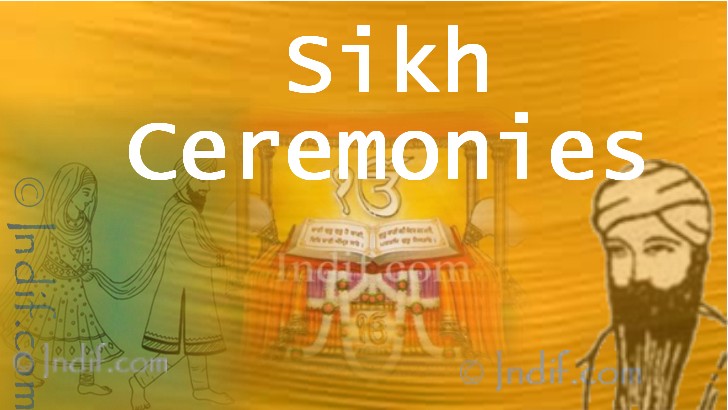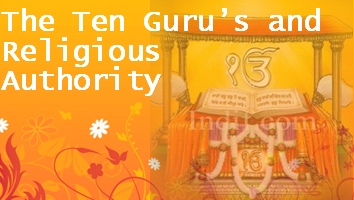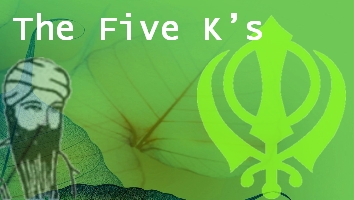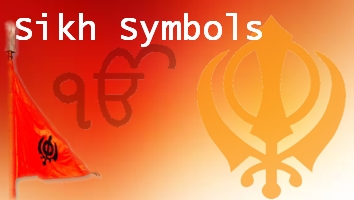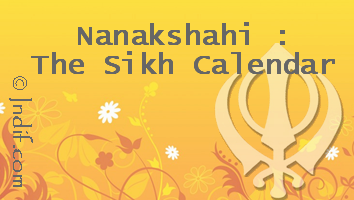ੴ
In Sikhism there are only a few special ceremonies for events like birth, initiation, marriage and death, which are simple, inexpensive and having a religious cause to them. Every Ceremony in Sikhism must be performed in the presence of the Guru Granth Sahib, and include singing of hymns, Ardas, or a formal prayer suitable to the occasion and after the ceremony Karah Parshad (sweet pudding) and Langar (food) must be served.
THE CEREMONIES:
NAAM KARAN (Naming Ceremony):
The naming ceremony of a new born sikh child is usually performed at the Gurdwara in the presence of near and dear ones. During the ceremony hymns from the Guru Granth Sahib are recited to celebrate the birth of the new child and the blessings for the good health and long life of the child are seeked. The holy Granth is opened at random and a verse (Shabad) from the pages opened is read. The first letter of the first word of the 'Shabad' (hymn) on the page is chosen as the initial letter of the child's name. The child's name is then chosen beginning with that letter and is announced to the congregation. To this selected first name the word 'Singh' or 'Kaur' is added. 'Singh' (means Lion) is used for a boy and 'Kaur'(means princess) for a girl.
AMRIT SANSKAR (Baptism)
Amrit Sanskar or
Baptism is the
most important
and sacred
ceremony in the
life of a Sikh.
It is in the
form of a formal
oath and
initiation
ceremony by
which a Sikh
becomes a true
Khalsa (purified
or chosen one).
The baptism is
done in a quiet
place, away from
distractions,
where
Sri Guru Granth
Sahib has
been installed.
The person
wishing be to
baptized is
required to wash
their hair,
cover their
head, wear clean
clothes and the
five K's
before
presenting
themselves
before six
Amritdhari Sikhs
(Sikhs those who
are already
baptized).
Five Amritdhari Sikhs will conduct the ceremony while one reads the Guru Granth Sahib.
During the
ceremony the
principles of
Sikhism are
explained to the
person wishing
to be baptized
which is then
followed by
Ardas and
opening of
Sri Guru Granth
Sahib to a
random page and
reading of a
hymn. Amrit
(sweet water) is
prepared in a
steel bowl and
stirred with a
kirpan by the
five beloved
ones. This is
followed by
Ardas and then
drinking of the
Amrit five times
each, by the
person wishing
to be baptized,
in cupped hands
and exclaiming
Waheguru Ji Ka
Khalsa,
Waheguru Ji Ki
Fateh.
Amrit is then sprinkled on the hair and eyes of the person and any leftover is drunk by all present.
This is followed by an explanation of the code of conduct and discipline required for a Amritdhari .
DASTAR BANDHI (Turban Tying):
The Sikhs tie turban for the first time on the head of a child in presence of Sri Guru Granth Sahib. Usually, when a Sikh boy is between the age of 11 to 16, this ceremony is performed. At this ceremony, Ardas is recited and then the child's first turban is ceremonially tied on by the Granthi.
ANAND KARAJ (Marriage):
Anand Karaj is
the Sikh
marriage
ceremony which'
literally means
a "Blissful
Union". It
is neither a
contract, nor an
agreement; it is
a spiritual
union. This
ceremony
normally takes
place at a
gurdwara (Sikh
temple),
although not
necessarily so;
the marriage may
also be
conducted at the
bride's
residence or any
other place
where the
Guru Granth Sahib
has been
installed.
Members from
both families
gather in the
sangat
(congregation).
In the Anand Karaj ceremony, the Granthi reads a selection of Shabads (hymns) written by the Fourth Sikh Guru, Guru Ramdas.
In these
Shabads, which
are called the
Lava, there are
four stanzas.The
first verse is
recited by the
Granthi while
the couple sits.
Then the Ragees
sing the same
verse and the
couple walks
gracefully
clockwise around
the
Guru Granth
Sahib the
bride following
the bridegroom.
Same way the
other three
verses are
recited. In
doing so, they
will reaffirm
their commitment
to the spiritual
path. The six
verses of 'Anand
Sahib' (the
hymns of joy)
are then sung
followed by the
Ardas and by
the distribution
of Karah
Parshad. Lunch
is provided by
the brides
family.

